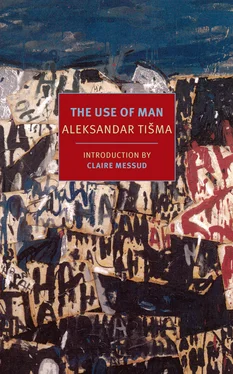Aleksandar Tišma - The Use of Man
Здесь есть возможность читать онлайн «Aleksandar Tišma - The Use of Man» весь текст электронной книги совершенно бесплатно (целиком полную версию без сокращений). В некоторых случаях можно слушать аудио, скачать через торрент в формате fb2 и присутствует краткое содержание. Год выпуска: 2014, Издательство: NYRB Classics, Жанр: Современная проза, на английском языке. Описание произведения, (предисловие) а так же отзывы посетителей доступны на портале библиотеки ЛибКат.
- Название:The Use of Man
- Автор:
- Издательство:NYRB Classics
- Жанр:
- Год:2014
- ISBN:нет данных
- Рейтинг книги:5 / 5. Голосов: 1
-
Избранное:Добавить в избранное
- Отзывы:
-
Ваша оценка:
- 100
- 1
- 2
- 3
- 4
- 5
The Use of Man: краткое содержание, описание и аннотация
Предлагаем к чтению аннотацию, описание, краткое содержание или предисловие (зависит от того, что написал сам автор книги «The Use of Man»). Если вы не нашли необходимую информацию о книге — напишите в комментариях, мы постараемся отыскать её.
A work of stark poetry and illimitable sadness,
is one of the great books of the 20th century.
The Use of Man — читать онлайн бесплатно полную книгу (весь текст) целиком
Ниже представлен текст книги, разбитый по страницам. Система сохранения места последней прочитанной страницы, позволяет с удобством читать онлайн бесплатно книгу «The Use of Man», без необходимости каждый раз заново искать на чём Вы остановились. Поставьте закладку, и сможете в любой момент перейти на страницу, на которой закончили чтение.
Интервал:
Закладка:
Vera had had no fondness for her home, and when the steamroller of war passed over it, turning it into a house of people deprived of all rights, her feelings were given external justification. Now it was a trap for her. Sometimes she tiptoed from room to room, from windows facing the street to windows facing the courtyard. The building in the back, the storeroom, was a barrier to her possible retreat, and the windows on the street side were breaches in the defending wall. Sometimes she listened to people’s voices — voices ordering merchandise, giving directions to the kitchen, greeting a guest — and they sounded to her like a strange ghostly jumble, confused echoes from another world. She asked herself what she was doing there and what bound her to the house. There were family ties, of course, ties, by her birth, to a father, a mother, a grandmother, and a brother. Yet when she searched their faces — she felt a need to look at them closely — she decided that her connection to them was a matter of chance, and harmful besides. Each one of them had his or her own idea of life, which was either different or else totally contrary to Vera’s. Her mother, for example, considered life to mean serving Gerhard, which Vera thought was altogether lacking in taste, while Gerhard dreamed only of rebellion, of deeds that were clearly doomed to fail and dangerous for the whole family. When she learned from Milinko that Gerhard was consorting with the hotheads on the outskirts of town, she tried to explain to him where this would lead, but he, condescending to her as always, laughed: “You, young lady, take care of your own nice round little bottom and keep quiet.”
But why should she keep quiet when it was her life that was being put at risk? In order to die quietly with the rest of the family? She had no stomach at all for such a family end, yet the house, remaining in the house, forced her toward death. Would leaving it bring salvation? But where to go, and with whom? She would not be able to escape by herself, not with this inexperienced, newly matured body of hers, so sensitive and vulnerable; she could see that clearly. With Milinko? But Milinko, coming to the house to see her, only stared wide-eyed at her father in the semidarkness of his room, and at his books, as if they contained clues to salvation, as if they could rescue one from being beaten, cursed, spat upon, killed. Several times she confided in him, told him of her terror, but in response received only moonstruck assurances of the inevitability of the victory of reason over the temporary forces of darkness, and in this she had no difficulty recognizing the self-absorbed delusions of the ineffectual father of the family, Robert Kroner. So she shut herself off from Milinko into a malicious silence, a silence broken only by a still more malicious, almost mocking encouragement, through which she pretended to be his pupil, the pupil’s pupil, and watched him swell with pride as a result of the deception. She began to think that everyone was pretending, boasting of a power they did not have, while those who had the power did not talk but simply made use of it.
When her mother’s brother, Sep, showed up unexpectedly at the house — she could just barely remember him as a boy from her rare childhood visits to Grandmother Lehnart’s village — he was serious, dry, unresponsive, with a revolver at his side, the symbol of his power over life and death. For a while she hoped (as she had hoped about many others) that perhaps he could save her. She tried to approach him, but he sought only Gerhard’s company; he even avoided her, for he was troubled by her youthful, sensual beauty, the alluring softness of her hips, the whiteness of her skin, her thick red hair, all of which, along with the knowledge that she was half-Jewish, even though his niece, aroused in him a secret lust.
Once, returning home late from his walk and supper, he could not find his key, and from the courtyard knocked on a window, thinking it was the maid’s. But it was the window of Vera’s room, and stretching out from it in her thin white nightgown with a deep opening between her swelling breasts, she handed him her key. That night he dreamed of a completely different redhead, much bigger than Vera, hovering above him, grazing his lips with huge, warm, milky breasts, but when he awoke, he knew that it was Vera. And Vera, too, dreamed. She dreamed of him as Saint George from a brightly colored picture she had seen in her childhood at Grandmother Lehnart’s: on a horse, holding a lance that pierced a green dragon with a thin red darting tongue. Mounted on that horse, they galloped off together, his strong, muscular arm around her waist. Stone echoed beneath her, the Turkish cobblestones of her street behind the Baptist church; sparks flew from the horse’s hooves; the wind sang, and it was a German song, in the voice of a male choir, “Der Erlkönig,” which she once learned at Fräulein’s, “Wer reitet so spät durch Nacht und Wind? Es ist der Vater mit seinem Kind,” and she knew that the dragon was behind them, dead and crushed, that they were leaving the town and, with it, all dangers and ties. She saw a new, unknown region splitting open before her eyes, craggy and mountainous, uninhabited and therefore safe. Saint George with the face of Uncle Sep dismounted from the horse and helped her down, placing a firm hand beneath her foot. When she stepped on the ground, he disappeared, and all around her, squatting on the soft grass, half hidden among luxuriant ferns, were a rabbit, a squirrel, a fox, a hen, a partridge, and a dozen other animals, all tame, whose shapes she recognized but whose names she did not know. Without interpreting her dream, in fact unaware that she was acting under its influence, she decided to tell her father that she wished to leave Novi Sad, to go to a place where she was not known, abroad if possible.
She found, to her surprise, that this was an idea that had been constantly on his mind, an idea that he was grateful for the opportunity to share with someone. He knew a great deal, it turned out, about the attitude of various governments toward the Jews, and of their treatment in countries in which they had already become the object of special measures. In Serbia, where the Germans ruled directly, without an intermediary government, from the very beginning the Jews had been placed outside the protection of the law; all their possessions were confiscated, they were driven from their houses, stripped of rank and profession, of the right to earn a living, used without payment as slaves for the most menial tasks, killed out of hand once they could no longer work. In Croatia, under the Ustaša government, there were no Jews at liberty; they were all in camps, and it was only a matter of time before they were exterminated. The Bačka, belonging to Hungary, which still clung to its bourgeois, even feudal traditions, was at the moment the best possible refuge among all the regions of dismembered Yugoslavia. In Hungary proper, said Kroner, the Jews still lived almost untouched, especially in the two-million-strong jungle of Budapest; the laws and regulations introduced against them had been subverted by the money and resourcefulness of the merchants, industrialists, and an active Jewish intelligentsia that had been absorbed into the public and cultural life of Hungary. To go to Budapest, to move there, would virtually mean returning to the old legal order, with just a few restrictions, but still with opportunities for work and earning a living, and for Vera and Gerhard it would mean a chance to study perhaps, and take part in the activities that were suitable for their age.
But when Vera expressed surprise that no steps had been taken yet for them to move there, her father suddenly became less definite, his lips quivered, his hands retreated into his coat pockets. He spoke of decades of work, his own and his father’s before him, of the business, the house, the accumulation of furniture, the goods in the storeroom for which he had not been given a receipt; he reminded her how attached his mother was to Novi Sad and her few remaining acquaintances, without whom she would probably die of grief; he mentioned his wife’s familiarity with the town’s market, and — showing an obtuseness that disheartened Vera, as if he were not talking to her but to a third person — he mumbled something about her own attachment to the town in which she had been born and grown up. Vera replied sharply that all these reasons counted for nothing against the alternative — physical annihilation — which would make short work of both habits and possessions. The reference to this extreme danger caused Kroner to lose his head altogether; he began to stammer, to breathe heavily. Assertions became exclamations, impotent curses, revealing what lay behind the appearance of reasoned argument: the dispiritedness of old age.
Читать дальшеИнтервал:
Закладка:
Похожие книги на «The Use of Man»
Представляем Вашему вниманию похожие книги на «The Use of Man» списком для выбора. Мы отобрали схожую по названию и смыслу литературу в надежде предоставить читателям больше вариантов отыскать новые, интересные, ещё непрочитанные произведения.
Обсуждение, отзывы о книге «The Use of Man» и просто собственные мнения читателей. Оставьте ваши комментарии, напишите, что Вы думаете о произведении, его смысле или главных героях. Укажите что конкретно понравилось, а что нет, и почему Вы так считаете.












